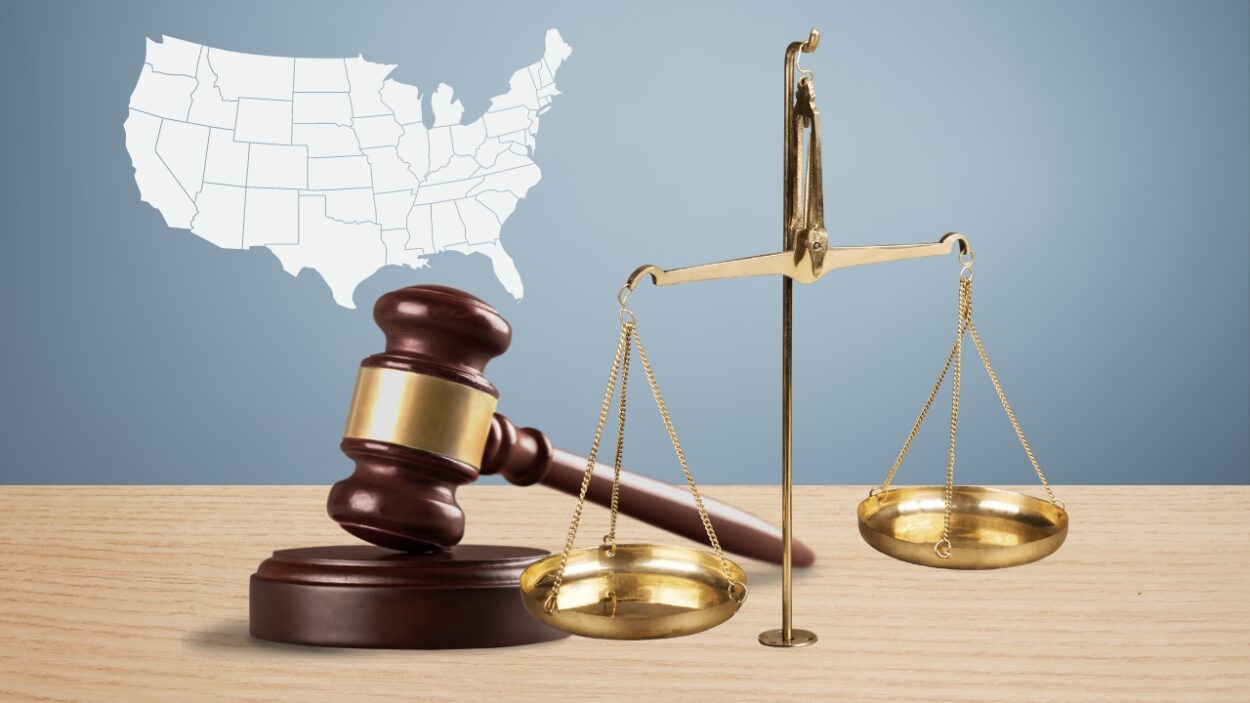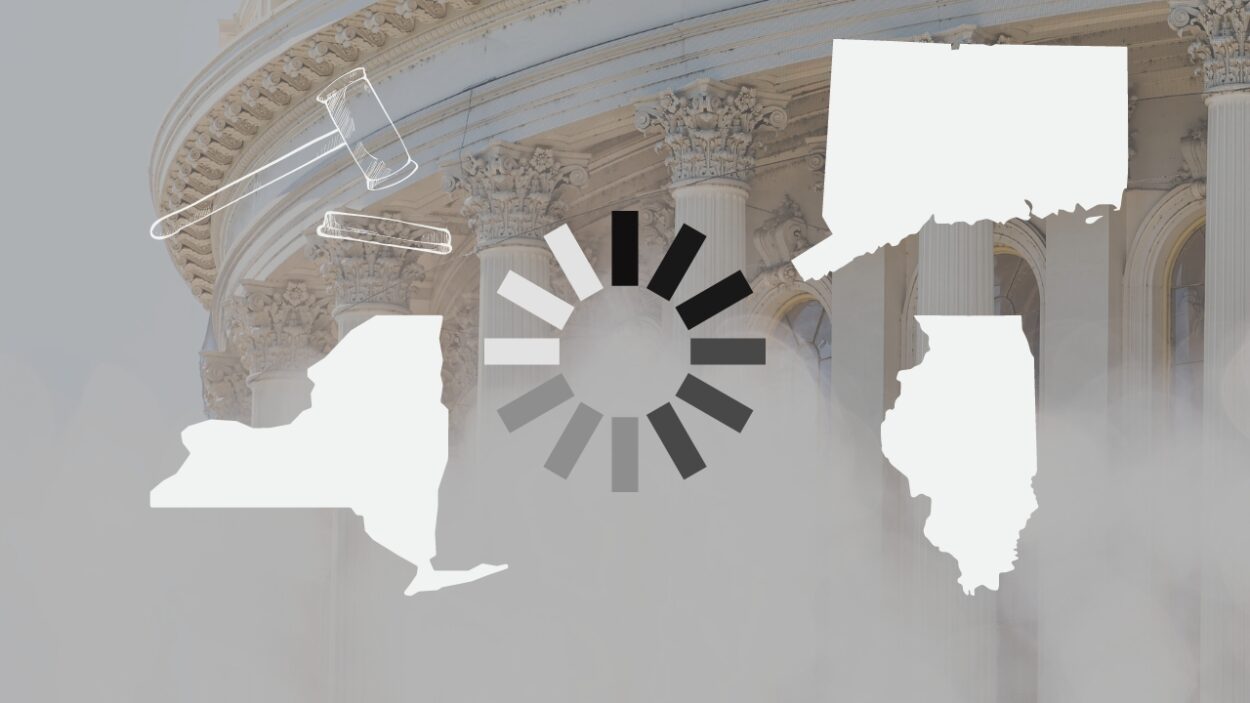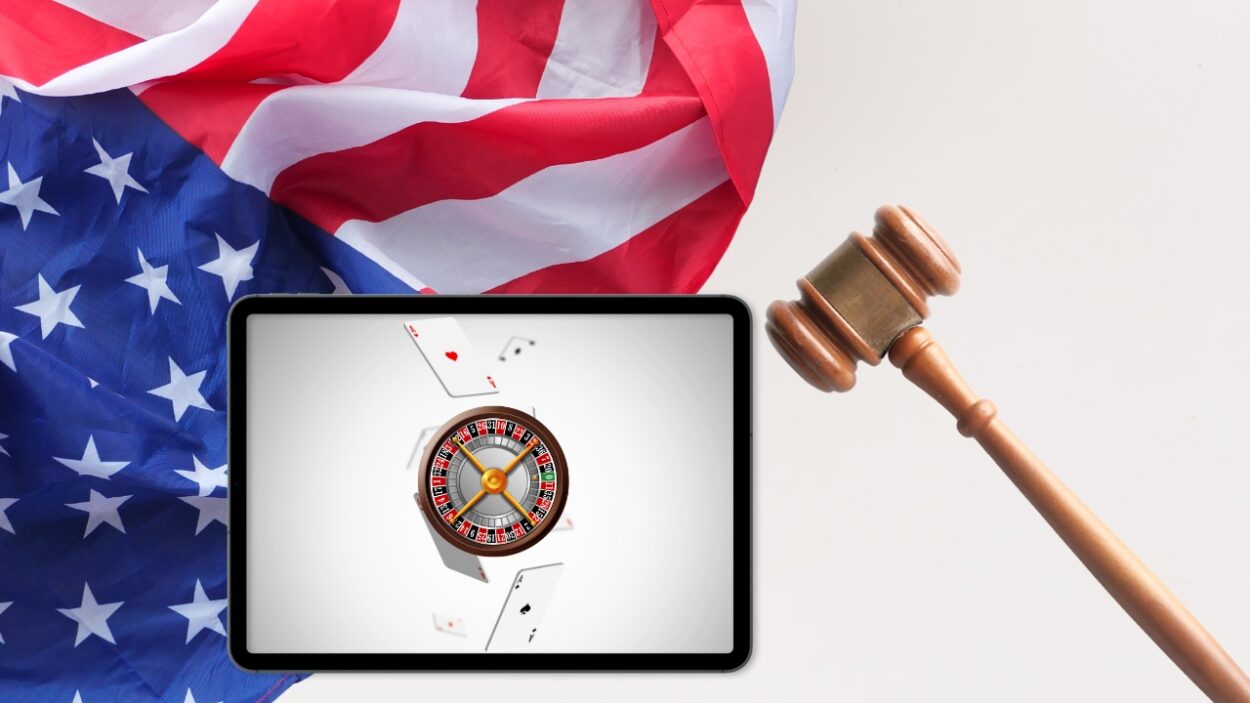iGaming is an umbrella term that encompasses all forms of online gambling that involve betting on a future prediction. Some examples that fall under the ‘iGaming’ category include:
- Online casino games
- Online sports betting
- Online Poker
- Esports
In 2022 the online gambling and betting industry was estimated to be worth around $63.53 billion. That’s insane- To put it into perspective, you could buy one hundred and ninety million Ferrari 296s with that!
Federal vs. State Regulation

The regulation of iGaming in the United States involves a complex interplay between federal and state laws.
Historically, federal legislation such as the Wire Act of 1961 and the Unlawful Internet Gambling Enforcement Act (UIGEA) of 2006 has shaped the legal landscape by imposing restrictions on certain forms of online gambling activities.
In 2018, the Supreme Court’s decision in Murphy v. NCAA paved the way for states to legalize sports betting, leading to a surge in legislative activity at the state level.
Source: https://www.sportstalkphilly.com
States Where iGaming is Legal
- Nevada: Known as the gambling capital of the world, Nevada was among the first states to legalize online poker in 2013. The state’s long-standing reputation as a hub for gaming innovation has positioned it as a pioneer in the iGaming space.
- New Jersey: Following the Supreme Court’s decision to overturn the Professional and Amateur Sports Protection Act (PASPA), New Jersey wasted no time in legalizing sports betting. Today, the Garden State boasts a thriving online gambling market, offering a wide range of casino games and sports wagering options.
- Pennsylvania: With the passage of comprehensive gambling legislation in 2017, Pennsylvania emerged as one of the most iGaming-friendly states in the country. Residents and visitors can enjoy online casinos, poker, and sports betting platforms licensed by the Pennsylvania Gaming Control Board.
- Michigan: In 2019, Michigan joined the ranks of states with legal online gambling, including both casino games and sports betting. The state’s robust regulatory framework ensures consumer protection and generates significant revenue for education and infrastructure projects.
- Delaware: As one of the first states to legalize online gambling, Delaware offers a variety of iGaming options through its licensed casino operators. Players can access virtual slots, table games, and poker tournaments from the comfort of their homes.
- West Virginia: Following the lead of neighboring states, West Virginia legalized online casino gaming and sports betting in 2019. The state’s licensing process prioritizes integrity and transparency, fostering a safe and competitive gaming environment.
States with Pending Legislation
While several states have embraced iGaming, others are still in the process of exploring regulatory options or awaiting legislative approval.
States such as New York, Connecticut, and Illinois have introduced bills to legalize online gambling, signaling growing momentum for expansion beyond traditional brick-and-mortar casinos.
States with Strict Prohibitions
Despite the rise of legalization, some states maintain strict prohibitions on iGaming activities. States like Utah and Hawaii have historically opposed gambling in any form, citing moral and social concerns.
Technological Advancements
One of the most significant drivers of change in the iGaming industry is technological innovation. From virtual reality (VR) casinos to blockchain-based gambling platforms, advancements in technology are revolutionizing the way people experience online gaming.
These innovations not only enhance the immersive nature of iGaming but also offer greater security, transparency, and efficiency for players and operators alike.
Expansion of Mobile Gaming
The proliferation of smartphones and mobile devices has transformed how people access and engage with online content, including iGaming.
Mobile gaming has become increasingly popular due to its convenience and accessibility, allowing players to enjoy their favorite casino games and sports betting activities on the go.
Regulatory Developments
Regulatory frameworks governing iGaming vary significantly from state to state, reflecting the diverse attitudes and approaches towards online gambling.
As more states legalize and regulate iGaming activities, there will likely be greater harmonization and standardization of regulations across the country.
Emergence of Esports Betting
Esports, or competitive video gaming, has exploded in popularity in recent years, attracting millions of viewers and participants worldwide. As esports continues to gain mainstream acceptance, the market for esports betting is also expanding.
Many states are exploring the legalization of esports betting, recognizing the potential economic benefits and consumer demand for wagering on competitive gaming events.
Social Responsibility and Player Protection
As the iGaming industry continues to grow, there is a growing emphasis on social responsibility and player protection.
Responsible gaming initiatives, such as self-exclusion programs and mandatory age verification measures, are increasingly being implemented to prevent problem gambling and protect vulnerable individuals.
Global Acceptance
iGaming is legal in many areas in the globe including:
| Country | Legalization Date |
| Australia | 2001 |
| Canada | 2019 |
| Belgium | 2010 |
| Brazil | 2018 |
| Denmark | 2012 |
| France | 2010 |
| Germany | 2012 |
| Ireland | 2015 |
| Italy | 2006 |
| Mexico | 2004 |
| Netherlands | 1964 |
| New Zealand | 2003 |
| Spain | 2012 |
| Sweden | 2019 |
| Switzerland | 2019 |
| United Kingdom | 2005 |
Regulatory Framework
The legalization of iGaming has had significant economic and social implications in countries where it is permitted. One of the most notable impacts is the contribution to government revenues through taxation and licensing fees. Governments use these funds to support various public services and initiatives, including healthcare, education, and infrastructure development.
Frameworks typically include provisions for licensing, taxation, consumer protection, and responsible gambling measures. Regulatory bodies oversee the operation of online gambling operators, ensuring compliance with established regulations and standards.
To address concerns linked to gambling, governments and regulatory authorities have implemented measures to promote responsible gambling practices, including self-exclusion programs, age verification procedures, and limits on advertising and promotions.
For example, in the United Kingdom, the UK Gambling Commission regulates iGaming activities under the Gambling Act 2005. Operators must obtain a license from the Commission to offer their services legally, and they are required to adhere to strict guidelines regarding player protection and anti-money laundering measures.
In jurisdictions like Malta and Gibraltar, regulatory authorities provide licenses to online gambling operators, subjecting them to stringent regulatory requirements. These frameworks aim to foster a safe and transparent environment for players while mitigating potential risks associated with online gambling.

















